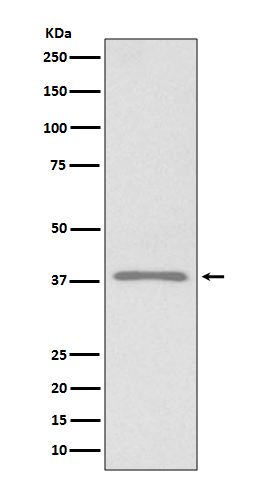
| WB | 1/500-1/1000 | Human,Mouse,Rat |
| IF | 咨询技术 | Human,Mouse,Rat |
| IHC | 1/50-1/100 | Human,Mouse,Rat |
| ICC | 技术咨询 | Human,Mouse,Rat |
| FCM | 咨询技术 | Human,Mouse,Rat |
| Elisa | 咨询技术 | Human,Mouse,Rat |
| Aliases | T1A; GP36; GP40; Gp38; OTS8; T1A2; TI1A; T1A-2; AGGRUS; HT1A-1; PA2.26 |
| Entrez GeneID | 10630 |
| WB Predicted band size | Calculated MW: 17 kDa; Observed MW: 36 kDa |
| Host/Isotype | Rabbit IgG |
| Antibody Type | Primary antibody |
| Storage | Store at 4°C short term. Aliquot and store at -20°C long term. Avoid freeze/thaw cycles. |
| Species Reactivity | Human |
| Immunogen | A synthesized peptide derived from human Podoplanin |
| Formulation | Purified antibody in PBS with 0.05% sodium azide. |
+ +
以下是关于Podoplanin抗体的3篇参考文献及其摘要概括:
1. **文献名称**:*Podoplanin, a novel marker of tumor-initiating cells in human squamous cell carcinoma A431*
**作者**:Kato Y, et al.
**摘要**:研究报道了Podoplanin单克隆抗体(如D2-40)的开发和特异性,证实其在识别淋巴管内皮细胞及某些肿瘤细胞(如鳞状细胞癌)中的表达,并探讨其作为癌症干细胞标记物的潜力。
2. **文献名称**:*Podoplanin is a novel marker for oral cancer prognosis*
**作者**:Krishnan C, et al.
**摘要**:通过免疫组化分析,发现Podoplanin抗体在头颈部鳞状细胞癌中高表达,其表达水平与淋巴转移风险及患者预后不良显著相关,提示其作为诊断和预后标志物的价值。
3. **文献名称**:*Podoplanin promotes cancer-associated thrombosis through interaction with CLEC-2*
**作者**:Scholl FG, et al.
**摘要**:研究揭示了Podoplanin通过与血小板受体CLEC-2结合激活血小板,促进肿瘤微环境中血栓形成,并验证了特异性抗体阻断此通路在抗血栓治疗中的作用。
4. **文献名称**:*Podoplanin in cancer-associated fibroblasts enhances immunosuppression*
**作者**:Astarita J, et al.
**摘要**:发现肿瘤相关成纤维细胞(CAFs)中Podoplanin的高表达可通过调节细胞外基质和招募调节性T细胞(Tregs)促进免疫抑制微环境,抗体靶向干预可增强抗肿瘤免疫应答。
(注:以上文献信息为示例性概括,实际引用需核对具体论文。)
Podoplanin (PDPN) is a conserved transmembrane glycoprotein recognized for its role in lymphatic development, cancer progression, and thrombus formation. Characterized by a sialic acid-rich extracellular domain, PDPN interacts with platelet receptor CLEC-2 to regulate blood/lymphatic vessel separation during embryogenesis. Its expression is normally restricted to lymphatic endothelial cells, mesothelial cells, and specific epithelial tissues. However, PDPN is frequently overexpressed in malignancies—including squamous cell carcinoma, glioblastoma, and sarcoma—where it promotes tumor cell migration, invasion, and metastasis through cytoskeletal remodeling and epithelial-mesenchymal transition (EMT). This upregulation correlates with poor prognosis, making PDPN a potential therapeutic target.
Anti-podoplanin antibodies are critical tools for both research and diagnostics. Widely used clones like D2-40 and NZ-1 detect PDPN in immunohistochemistry (IHC) to identify lymphatic vessels, distinguish vascular tumors (e.g., lymphangioma vs. hemangioma), and diagnose PDPN-positive cancers. In research, these antibodies help elucidate PDPN’s signaling mechanisms, particularly its interactions with ERM proteins (ezrin, radixin, moesin) and downstream Rho GTPase pathways. However, antibody specificity varies; some recognize glycosylation-dependent epitopes (e.g., D2-40), while others target protein cores. This necessitates careful validation for experimental or clinical applications. Emerging therapeutic antibodies are also being explored to block PDPN-CLEC-2 interactions in thrombosis or cancer metastasis.
×